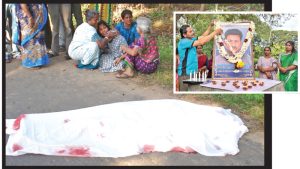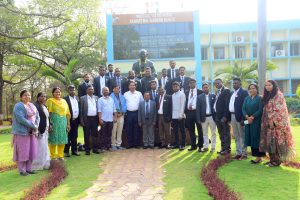Daily challenges faced by women headed families due to economic crisis in Sri Lanka – ( Arul karki )

“It has been 9 years since I separated from my husband. During this period, I have suffered untold hardships to save my family. I have suffered greatly due to the spread of Corona, as well as the economic crisis faced by the country”; Says 41-year-old Aingaran Thayaranjani from Vattikuti, thalavai, Jaffna. Thayaranjani is a palmyra leaf handicrafts maker and seller. she also has a small paddy field. For the last 15 years, she has been selling tailoring and palmyra products. she has 3 children. Tayaranjani’s biggest challenge is to meet their school expenses.
 The family also spends heavily on school expenses, food, and purchasing stationery. she says that he can only earn up to 5000 rupees per month from palm production. This can be ensured only if the offers come. Otherwise, the market opportunity for them becomes questionable. she also says that a palm kernel which was bought for 20rupees earlier is being sold for up to 200 rupees today. Her concern is that she cannot buy and sell her products for this amount.
The family also spends heavily on school expenses, food, and purchasing stationery. she says that he can only earn up to 5000 rupees per month from palm production. This can be ensured only if the offers come. Otherwise, the market opportunity for them becomes questionable. she also says that a palm kernel which was bought for 20rupees earlier is being sold for up to 200 rupees today. Her concern is that she cannot buy and sell her products for this amount.
Also, Thayaranjani’s father and her brother, who is suffering from encephalitis, are staying with her. she also covers their expenses. So, this woman has the responsibility of supporting the entire family. Her eldest daughter has completed her schooling and is working as a clerk in a shoe factory. A large number of women-headed families like her are facing great struggles for their livelihood in the North on a daily basis. They are facing with this crisis situation due to insufficient income in the industry due to lack of employment.
Similarly, 47-year-old Umakanthan Saraswathi from Vattukkottai, Pillaiyaradi, Sankaratti has been living separated from her husband for the past 7 years. A mother of three children, she earns her livelihood by selling pet products with a scarf. Her eldest child is studying in O/L while the other two are studying in GRADE 10 and GRADE 07.
 Through the conversation with her, it was learned that school expenses have severely affected this family. The total income of this family is only up to Rs.15000. Mrs. Saraswati has to deal with everything like house rent, food requirements, education expenses. A house hold manufactured by her is sold for Rs.60. But the cost of production has increased. she buys a kilo of coconut shell at Rs.35 and other things at Rs.1800. Saraswathi says that due to the lack of market opportunities for her products, it is customary to sell her products. Her challenge is not being able to earn enough income even though a house hold for Rs.30 earlier is sold for Rs.60.
Through the conversation with her, it was learned that school expenses have severely affected this family. The total income of this family is only up to Rs.15000. Mrs. Saraswati has to deal with everything like house rent, food requirements, education expenses. A house hold manufactured by her is sold for Rs.60. But the cost of production has increased. she buys a kilo of coconut shell at Rs.35 and other things at Rs.1800. Saraswathi says that due to the lack of market opportunities for her products, it is customary to sell her products. Her challenge is not being able to earn enough income even though a house hold for Rs.30 earlier is sold for Rs.60.
Also, a charity organization has helped her in do chicken farm. she said that although it is seen as a supplementary income, the industry is also facing difficulties due to the increase in maintenance expenses of chicken feed. she says that she can partially cope with this by providing small loan assistance from women society. Although many female-headed families in the North are receiving such assistance from charitable organizations, they are facing massive hardships due to the sudden rise in commodity prices.
Similarly, 40-year-old Devan Kumari is separated from her husband and lives with her mother and daughter. she makes her living by working in a shoe factory in Chittankeni area. Many people like her are working here. she says that it is very difficult for them to manage the expenses of the entire family, who get Rs.500 per day as daily wages. They are unable to earn enough income in the industry due to factors such as rising prices of raw materials including rubber seed used for sandal production, falling sales, and market opportunity. A pair of rubber footwear which was sold for Rs.150 before the economic crisis is sold for Rs.500 today. However, the women working in the said factory report that there has been a sharp drop in sales. This has directly affected them economically.
Similarly, female-headed families are found in many of the families that depend on fishing in Jaffna’s Pasayoor area. In Pasayoor alone, there are 87 families headed by women who have lost their husbands, says Paranthaman Madan, president of Pasayoor Fishermen’s Association. This is a huge problem in this region.
Mainly because there is no permanent employment for them, the women going to daily wage labor. This includes women who have lost their husbands due to war and women living alone with their children after being separated from their husbands. Madan says that Pasayoor Fishery Association gives priority to such female-headed families in its services to these women.
In general, Pasiyoor area is dominated by low-income families. Especially we will give priority to women headed families while providing our services. Most of the women go to various places in the city for domestic work. They also go into small scale temporary industries. We give donations to them by the association. We provide jobs with allowances to such women for the work carried out by the association.” says Madan. He also said that they are doing work such as providing career opportunities, helping education, providing dry food, etc. Madan says. have been provided to the students of female headed families in Pasayoor area in collaboration with the church. However, Madan says that this is not possible in all periods and due to the economic crisis, they have faced more difficulties.
On the other hand, many industries have been directly affected by the economic crisis that the country is facing. One of them is the boat building industry. While talking to Anthony Pillai Devakumar, the owner of boat building company “Aagsmin” in Pasayoor area of Jaffna, we got to know the challenges faced by women entrepreneurs here. He said, “Up to 30 women were employed in our company earlier. Today there are not even 08 people. 05 of them are known as female headed families. We give priority to them in our company in providing employment. The industry is run with huge investment. But the profit is very small. Due to the economic crisis, fiber plates, a raw material for boat building, have gone up in price. As a result, these women have lost their jobs. Therefore, the industry may have to be abandoned in the future. He said that we are also exploring other ventures in the future.
 When asked about these matters, Director of Jaffna Women’s Development Association Mrs. Saroja Siva Chandran shared her views. “We used to work in 8 districts in north and east through our association. But currently we are providing our services in three districts in Northern Province. Aids are provided to us through the organization. We mainly work with female headed families. Significant low-income families in the North have been affected by the recent economic crisis. Chief among them are female-headed families. They are facing huge problems in the fields of livelihood, land issue, education, nutrition etc. We provide assistance to them as three lawyers of our association. Our association provides scholarships, scholarships and grants to students from female-headed families and provides assistance to the undernourished,” she said.
When asked about these matters, Director of Jaffna Women’s Development Association Mrs. Saroja Siva Chandran shared her views. “We used to work in 8 districts in north and east through our association. But currently we are providing our services in three districts in Northern Province. Aids are provided to us through the organization. We mainly work with female headed families. Significant low-income families in the North have been affected by the recent economic crisis. Chief among them are female-headed families. They are facing huge problems in the fields of livelihood, land issue, education, nutrition etc. We provide assistance to them as three lawyers of our association. Our association provides scholarships, scholarships and grants to students from female-headed families and provides assistance to the undernourished,” she said.
Also, “Due to the economic crisis, more and more women are affected by domestic violence. All these require us to move towards sustainable solutions. In that way, we are providing a child right course for the women of Northern Province regarding child care. Also, we have included the issues of Northern women in the women in action plan developed by the Ministry of Women’s Affairs. We have also presented our reports regarding solutions to such problems of women in many international conferences,” she said. Among these issues, there is a need to implement a national program focusing on the economic crisis for women headed families in Northern Province. There is a need to carry out province-wide surveys and stabilize their daily livelihoods by using regionally available resources.
During our visit, it was observed that the same situation is found in the female-headed families in the Eastern Province as well. Female-headed families dependent on palm leaf production in Chengaladi and Eravoor regions are facing the same challenge due to economic crisis. The family of 39-year-old Vijayanila’s from Chengaladi region has been making a living from palm production for the past 9 years. Following the economic crisis, their raw material and marketability have come into question.
Like her, 58-year-old Meera Mukhaideen Rasamathumma also made her living by making mats and baskets. Separated from her husband, she is struggling daily to manage housing, daughter’s education expenses, food and medical expenses. she says that their lives were somewhat comfortable before the economic crisis.
 People like PG Ranthenia and Mrs. Indika Chamali from the Sinhalese settlement of Eravoor are making their daily income from palm products. We were able to observe that they are also facing serious difficulties due to the increase in the price of raw materials and essential commodities. Also lack of sustainable market opportunity for their products is a huge problem.
People like PG Ranthenia and Mrs. Indika Chamali from the Sinhalese settlement of Eravoor are making their daily income from palm products. We were able to observe that they are also facing serious difficulties due to the increase in the price of raw materials and essential commodities. Also lack of sustainable market opportunity for their products is a huge problem.
Also, Aisha Ummah’s husband from Kalantar Veedi, Eravoor is a leg amputee. Aisha Ummah’s family makes a living by selling palm leaf products. Like her, 38-year-old Nazhira runs a small vegetable shop. Following the economic crisis, their business has suffered setbacks due to the sudden increase in the price of vegetables and the cost of transportation. We also observed that 63-year-old Paripathima was saving a family of 4 people by selling string hoppers them. The absence of any scheme to protect them economically despite their industrial cottage industry was perceived as a shortcoming. Everyone from this region points out that there is a need to implement special programs for women who have lost their husbands through the local governmental authorities.
The same situation is observed in Matara district as well. Ramasamy Ranjani, a mother of two children from Matara district, has lost her husband. After the death of her husband, who is a driver, in 2021, she has to shoulder the responsibility of her mother and children alone. He has to spend a huge amount on the education expenses of his daughter who is a advance level student. her older mother also works in a house in the city. Ranjani also does not have a permanent career.
she saves her family by going to nearby villages as a laborer. If so per day Ranjani says that only Rs. 600 is available. The family is facing a huge crisis due to the increase in children’s education expenses. Similarly, the lack of facilities for self-employment in their estate is also a drawback.
Similarly, Somaratha Damayanti, who works as a tea picker in Thalkaswella estate in Galle district, is a mother of three children. She is separated from her husband due to native land issue and has been living in a rented house with her three children for the past 15 years. Damayanti says that the debt burden has increased due to the economic crisis. she says that due to the increased cost of transport to school, the situation of his children being interrupted has arisen. Structurally, the absence of any structures to protect such female-headed families is a setback.
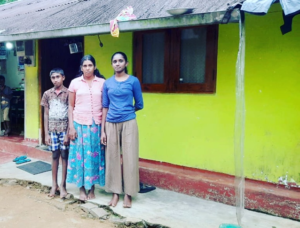 We also approached women headed families in Kaluthara and Rathnapura districts who face the same problems on a daily basis and inquired about their situation. logaletchumi, a widowed woman, bears the burden of her family alone. Permanently unemployed, she goes to nearby villages and earns his living by doing wage work. A challenge for them is the lack of a job that can earn them a monthly income.
We also approached women headed families in Kaluthara and Rathnapura districts who face the same problems on a daily basis and inquired about their situation. logaletchumi, a widowed woman, bears the burden of her family alone. Permanently unemployed, she goes to nearby villages and earns his living by doing wage work. A challenge for them is the lack of a job that can earn them a monthly income.
belonging to rakwana area. puvaneshwari s husband also says that she goes to wage labor as she has no permanent job. Their biggest problem is that the cost of education has increased. Like them, M. Renuka, who works as a wage earner to support her family, is a single mother who bears the responsibility of her 5 children. We were shocked when she told us that her children have not gone to school for the past one year due to high expenses.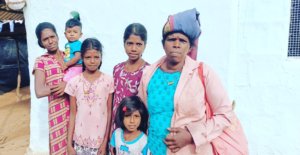
Chidambaram Niranjan, a social activist, commented on such conditions in the Rathnapura Habukasthenna area and said, “This area is a estate where many poor families live. Self-employment opportunities are very less for them here. Due to this, they incur high transport costs and go to Rathnapura and Avissawala for their daily activities. If the government promotes self-employment programs in our area, it will be of great help to such families,” he said.
advocate Mr. Srinath Perera, General Secretary of the Federation of Independent Trade Unions, that the government’s programs do not reach female-headed families in an appropriate manner, which causes them to suffer economically immediately. He further said, “Through our union, we are paying attention to the problems of such female-headed families nationally. But the data related to them is not available in government institutions.
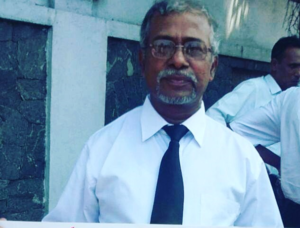 They should be identified as a separate affected social group and their needs should be met. Universities can analyze and compile information related to such families. Such families are found in all regions of the country. But the nature of the problems varies from region to region. Such families face problems such as malnutrition, child marriages, school dropouts, and early entry into the workforce. These should be properly reported and national programs developed. Providing employment to such families would also be a better solution,” says lawyer Srinath Perera.
They should be identified as a separate affected social group and their needs should be met. Universities can analyze and compile information related to such families. Such families are found in all regions of the country. But the nature of the problems varies from region to region. Such families face problems such as malnutrition, child marriages, school dropouts, and early entry into the workforce. These should be properly reported and national programs developed. Providing employment to such families would also be a better solution,” says lawyer Srinath Perera.
Similarly, when Nalini Ratnarajah, a feminist activist and human rights activist was approached and asked about the sustainable solutions for this as it is seen as a national problem, she shared her views like this. “Women headed families are found in all ethnic groups like Sinhalese, Tamil and Muslim communities in the country. Most of them are people who have established their livelihood through handicrafts. Their labor is being exploited due to lack of market opportunity for their products, aggression of brokers etc. Faced with increased cost of living, problems in girls’ education, personal hygiene, etc. are seen in female-headed families. At least in the North-East there is some infrastructural facilities, but not so in the plantation sector.

Today women earn us foreign exchange. But neither the government nor the political parties directly do anything for such families. There are no plans for proper utilization of existing resources. The government is fully responsible for this. New policy programs focused on female-headed families should be implemented. Grants and loans can also help strengthen them. Likewise, the implementation of programs for these people with the partnership of civil society, non-governmental organizations, private sector, etc. will help them recover economically,” she said.
Taken together, it is a national problem that women-headed families are affected by the economic crisis. Therefore, there is a need to devise programs for them at the national and regional levels. And strengthening them technically and preparing them for new business ventures are the best arrangements for the economic crisis that the country is currently facing. It is also worth noting that short-term welfare programs can be carried out through the local government for the education, health, and nutrition of the children of these families.




